Here in this blog post, we will tell you everything you need to know about Mini highland cow. This animal recently has captured the hearts of many because of charming appearance. Mini highland or Miniature highland cow are the perfect choice of animals if you are looking for a friendly, manageable and charming addition to your small farm or home. These animals offer you the iconic look of a traditional highland cow but in a smaller size. Whether you’re searching for this Cow for sale or you simply want to learn more about these cute creatures, you’ve come to the right place.
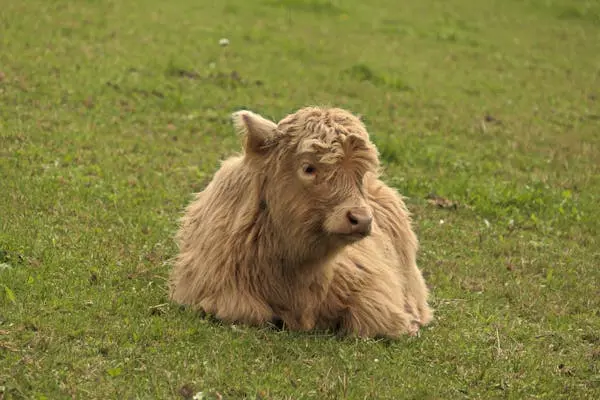
About Mini Highland Cow?
The Mini Highland Cows also known as Miniature Highland Cattle, is a cattle breed originating from the Scottish Highlands. These cows are a tough and hardy breed, because they can withstand both extreme cold and hot temperatures if they have adequate food, water and shelter. Miniature highland cows are considered calm and passive animals that make a great outdoor companion. Along with their calm nature, these animals also enjoy being around people and other animals, making them a fantastic option as a pet.
Origin and History:
These Highland Cows are a smaller version of the traditional Scottish Highland cattle, a cow bread native to the rugged highlands of Scotland. The Highland breed belongs to the Hebrides Island and the Isle of the Sky. Over there in their native land, they are selectively bred to be hardier and bigger in size. However, now the miniature version is selectively bred to offer the cuteness and resilience of the original breed but in a smaller size, suitable for smaller properties and family farms.
Key Characteristics:
The miniature highland cow are selectively bred to make them hardy and resilient. These cows have thick coat, long horns, docile nature. All of these unique characteristics that make them withstand extreme temperatures and easier to handle. Lets discuss these one by one:
Coat: One of the most distinguishing feature of a Mini Highland cow is their long, thick and shaggy coat. This double layered coat helps them stay warm in the cold and gives them their cute and fluffy look.
Horns: Both males and females have horns, which is the identifiable feature of this cattle. The horns are long and curved,
Nature: These can look intimidating with their long horns but they are known for their gentle and friendly nature. These cows are very calm and approachable and look for company, making them ideal for families and children.
Size and Lifespan:
Average Size: These cows are well known for their small height and less weight compared to the traditional highlanders. Their height varies depending on the type but they are typically between 36 to 48 inches tall to the shoulder and some can even reach 52 inches. The smallest ones will stay around 36 inches or smaller, the medium ones can reach up to 42 to 46 inches and if you want a little bigger one you can also get the 52 inches ones. Their weight on the other hand depend upon their health and their size but typically a mature highland cow will weigh around 400 to 700 pounds.
Lifespan: Normally the life span of a miniature highland cattle can range from 15 to 20 years, similar to standard Highland cows. It all depends upon how healthy is your animal. With proper diet and nutrition, stress-free environment, and routine veterinary care you can even prolong it to 20 years.
Perfect for Pets and Small farms:
Mini Highland Cows are the perfect fit as a pet and for your homestead because of their small size and stature and calm nature. Whether you need them for your small farm, hobby farm, or as a companion animal, they will fit right into your needs. They don’t require a large area to graze and can adapt to smaller spaces, which makes them ideal for small urban and suburban farmers.
Images:
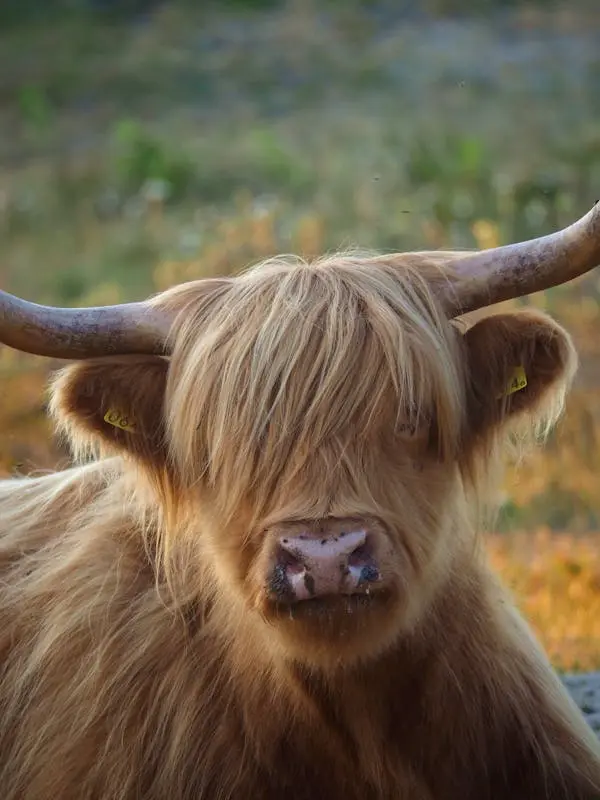
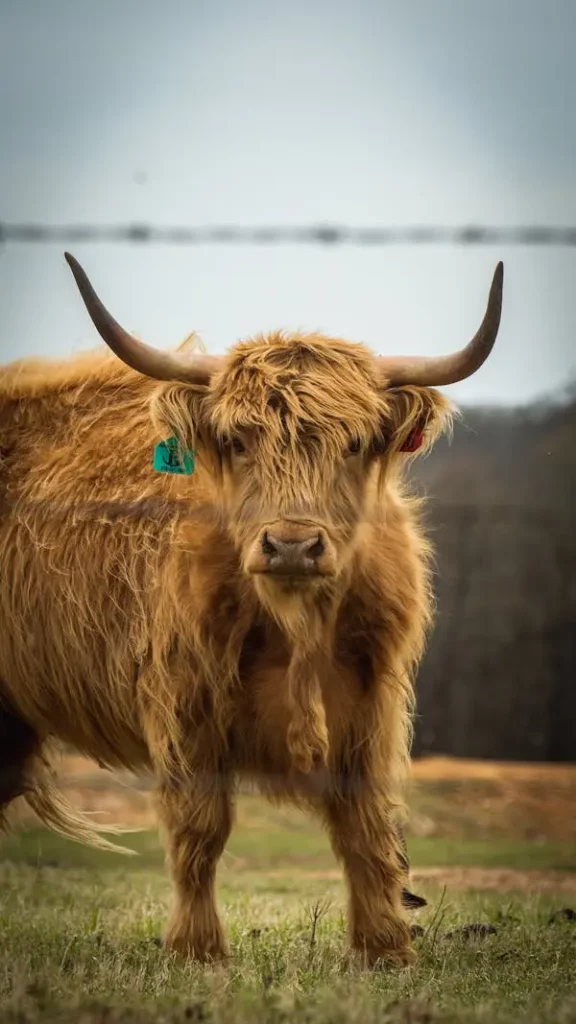
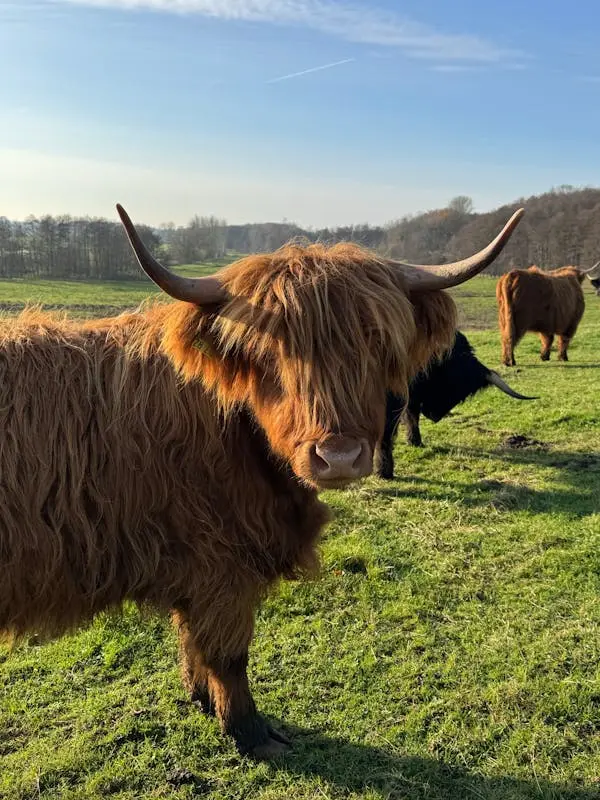
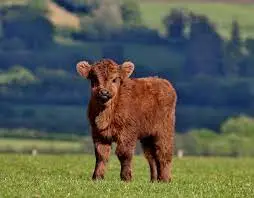
Why Choose a Mini Highland Cow?
Here’s why Mini Highland Cows might be the ideal choice for you:
Low Maintenance:
Mini highland Cows are very easy to handle and require very less daily care compared to the other cow breeds. This makes them ideal for beginners and busy farm owners.
Child and Pet Friendly:
Their gentle and calm nature makes them comfortable around pets and children. These cows get along well with company and create a fun filled energy to your homestead.
Highly Photogenic:
One added benefit of these animals are their extremely cute and charming personalities. These fluff balls are social media stars by birth and they can make you viral on Instagram and TikTok by capturing the hearts of many with their cuteness.
Small size:
Their miniature size means that they don’t need huge open air pastures, making them an ideal option for small farms. These animals can also easily adapt to small areas making them a good fit for your backyard.
Huggable:
Their thick, shaggy double coats make them like a walking teddy bear. Their fluff makes them irresistibly soft and snuggly. A full grown mini highland cow is also a great pet which you can squeeze out of love and he wont be bothered at all.
How to Get a Mini Highland Cow:
Finding these cows for sale is way easier than you might think, but its important to source it from a reputable breeder. You need to make sure the breeder prioritizes the health and temperament of their animals and also works within ethical considerations. Many breeders and farmlands offer calves or young cattle that are well-socialized and ready to be your companion. Check out local livestock markets, farm directories or online forums dedicated to cattle enthusiast. You can also search for web for sale near me to get nearby options
Care & Maintenance Overview:
Feeding and Shelter Basics:
Mini Highland are natural foragers and do well on a diet of good quality pastures and hay. These cows primarily eat grass in summer and eat hay in winter. Fresh, clean water should also be available and supplements should be given to keep them healthy. Although they have a coat but still they need a sturdy shelter to protect them from extreme weather.
These cows are incredibly weather resistant because of their thick coat. They don’t necessarily need protection from the environment but to ensure a healthy and long living cow you can provide these facilities:
- Provide access to Trees or shaded structure to protect them from scorching sun.
- In colder months, ensure they have access to a wink break and dry beddings.
- A simple 3 sided shelter is usually enough for most climates. They don’t need a fancy barn just something to shield them from snow, rain and wind.
Grooming Needs:
Since you are getting a small furball you also need to take care of it. Regular grooming is very important to keep the long coat clean and healthy. Brushing your cow will help you prevent matting and allow you to check for any skin issues or parasites. It is also recommended to groom your cow seasonally, especially during shedding periods.
Common Health Concerns:
Miniature Highland cows are called hardy because of their disease-resistance, but since they all after all animal, they can still face health issues. You being an owner should be aware of the common issues so you can catch problems early on and ensure a healthy and long life for your cow.
Parasite( Internal and External):
Issue: Worms and external parasites like ticks and lice can cause irritations and stress to your animal. Along with that it also affect the weight, coat quality, and overall health.
Solution: Regular combing and inspection of coat will help you get spot external parasites. Regular deworming and parasite control, especially during seasonal changes. Always consult a vet for a proper schedule
Hoof Problems:
Issue: Hoof problems also cause irritations and stress. Overgrown hooves or hoof rot from wet, muddy conditions can cause pain to the animal.
Solution: Once every 6 to 12 months inspect the hooves and trim according as needed and keep their shelter dry and clean.
Respiratory Infections:
Issue: Due to poor ventilation or sudden weather changes respiratory illnesses can arise and cause diseases to your animal.
Solution: Ensure that your shelter has proper ventilation and good air flow. Watch out for any symptoms like coughing, nasal discharge, or abnormal breathing and consult a vet immediately.
Bloat:
Issue: Overeating lush grass and grain can cause bloat, a life-threatening condition where the cow’s stomach is filled with gas.
Solution: Monitor the diet of your animal and avoid sudden dietary changes , Feed high risk foods like clover in moderation, and monitor the cow’s behavior after meals.
Prevention Tips:
- Regular vet Visits:
- Routine vaccination and parasite control
- Clean and dry the shelter weekly.
- Provide balanced diet with mineral supplements.
- Keenly observe any odd behavior and early signs of illness. These include changes in appetite, behavior, or movement.
Comparison Table
| Feature | Mini Highland Cow | Traditional Highland Cow |
| Height | 36–52 inches | 48–60 inches |
| Weight | 400–700 lbs | 1,000+ lbs |
| Maintenance | Low | Medium-High |
| Ideal For | Small farms, pets | Commercial farms |
Final Thoughts:
Mini Highland cow is not just a Farm Animal, it known for friendly temperament, gentle, Hardy, attractive and wonderful companion for small farms. Additionally, these little ones like a pet animal is a low maintenance and acquire a less space as compared to other breed cows. These easily bear hot weather as well as can survive in a harsh weather condition, which make these breed popular across the word. So Don’t miss a chance to own this animal like a Pet
FAQS:
The life span of Miniature cow depends on many factors such as care, diet and living condition, but some how the perfect life span is 15 to 2o years.
These cows are small in size compared to other traditional cows and the biggest size found right now is 48 inches.